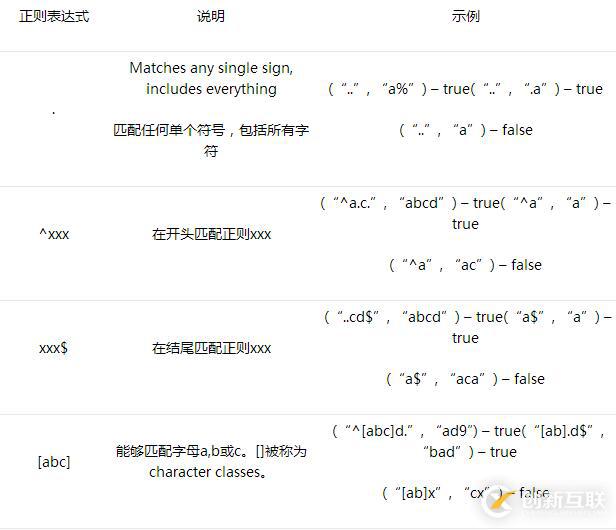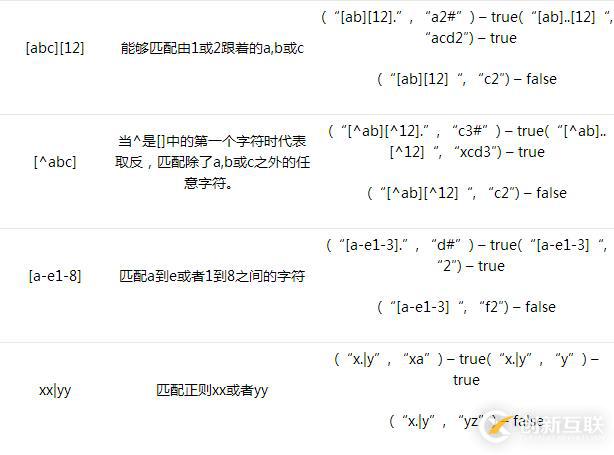Java正則表達式怎么用-創(chuàng)新互聯(lián)
小編給大家分享一下Java正則表達式怎么用,相信大部分人都還不怎么了解,因此分享這篇文章給大家參考一下,希望大家閱讀完這篇文章后大有收獲,下面讓我們一起去了解一下吧!

什么是正則表達式?
正則表達式定義了字符串的模式。正則表達式可以用來搜索、編輯或處理文本。正則表達式并不僅限于某一種語言,但是在每種語言中有細(xì)微的差別。Java正則表達式和Perl的是最為相似的。
Java正則表達式的類在 java.util.regex 包中,包括三個類:Pattern,Matcher和PatternSyntaxException。
Pattern對象是正則表達式的已編譯版本。他沒有任何公共構(gòu)造器,我們通過傳遞一個正則表達式參數(shù)給公共靜態(tài)方法 compile 來創(chuàng)建一個pattern對象。
Matcher是用來匹配輸入字符串和創(chuàng)建的 pattern 對象的正則引擎對象。這個類沒有任何公共構(gòu)造器,我們用patten對象的matcher方法,使用輸入字符串作為參數(shù)來獲得一個Matcher對象。然后使用matches方法,通過返回的布爾值判斷輸入字符串是否與正則匹配。
如果正則表達式語法不正確將拋出PatternSyntaxException異常。
讓我們在一個簡單的例子里看看這些類是怎么用的吧
package com.journaldev.util;
import java.util.regex.Matcher;
import java.util.regex.Pattern;
public class RegexExamples {
public static void main(String[] args) {
// using pattern with flags
Pattern pattern = Pattern.compile("ab", Pattern.CASE_INSENSITIVE);
Matcher matcher = pattern.matcher("ABcabdAb");
// using Matcher find(), group(), start() and end() methods
while (matcher.find()) {
System.out.println("Found the text \"" + matcher.group()
+ "\" starting at " + matcher.start()
+ " index and ending at index " + matcher.end());
}
// using Pattern split() method
pattern = Pattern.compile("\\W");
String[] words = pattern.split("one@two#three:four$five");
for (String s : words) {
System.out.println("Split using Pattern.split(): " + s);
}
// using Matcher.replaceFirst() and replaceAll() methods
pattern = Pattern.compile("1*2");
matcher = pattern.matcher("11234512678");
System.out.println("Using replaceAll: " + matcher.replaceAll("_"));
System.out.println("Using replaceFirst: " + matcher.replaceFirst("_"));
}
}既然正則表達式總是和字符串有關(guān), Java 1.4對String類進行了擴展,提供了一個matches方法來匹配pattern。在方法內(nèi)部使用Pattern和Matcher類來處理這些東西,但顯然這樣減少了代碼的行數(shù)。
Pattern類同樣有matches方法,可以讓正則和作為參數(shù)輸入的字符串匹配,輸出布爾值結(jié)果。
下述的代碼可以將輸入字符串和正則表達式進行匹配。
String str = "bbb";
System.out.println("Using String matches method: "+str.matches(".bb"));
System.out.println("Using Pattern matches method: "+Pattern.matches(".bb", str));所以如果你的需要僅僅是檢查輸入字符串是否和pattern匹配,你可以通過調(diào)用String的matches方法省下時間。只有當(dāng)你需要操作輸入字符串或者重用pattern的時候,你才需要使用Pattern和Matches類。
注意由正則定義的pattern是從左至右應(yīng)用的,一旦一個原字符在一次匹配中使用過了,將不會再次使用。
例如,正則“121”只會匹配兩次字符串“31212142121″,就像這樣“_121____121″。
正則表達式通用匹配符號


Java正則表達式元字符

有兩種方法可以在正則表達式中像一般字符一樣使用元字符。
在元字符前添加反斜杠(\)
將元字符置于\Q(開始引用)和\E(結(jié)束引用)間
正則表達式量詞
量詞指定了字符匹配的發(fā)生次數(shù)。

量詞可以和character classes和capturing group一起使用。
例如,[abc]+表示a,b或c出現(xiàn)一次或者多次。
(abc)+表示capturing group “abc”出現(xiàn)一次或多次。我們即將討論capturing group。
正則表達式capturing group
Capturing group是用來對付作為一個整體出現(xiàn)的多個字符。你可以通過使用()來建立一個group。輸入字符串中和capturing group相匹配的部分將保存在內(nèi)存里,并且可以通過使用Backreference調(diào)用。
你可以使用matcher.groupCount方法來獲得一個正則pattern中capturing groups的數(shù)目。例如((a)(bc))包含3個capturing groups; ((a)(bc)), (a) 和 (bc)。
你可以使用在正則表達式中使用Backreference,一個反斜杠(\)接要調(diào)用的group號碼。
Capturing groups和Backreferences可能很令人困惑,所以我們通過一個例子來理解。
System.out.println(Pattern.matches("(\\w\\d)\\1", "a2a2")); //true
System.out.println(Pattern.matches("(\\w\\d)\\1", "a2b2")); //false
System.out.println(Pattern.matches("(AB)(B\\d)\\2\\1", "ABB2B2AB")); //true
System.out.println(Pattern.matches("(AB)(B\\d)\\2\\1", "ABB2B3AB")); //false在第一個例子里,運行的時候第一個capturing group是(\w\d),在和輸入字符串“a2a2″匹配的時候獲取“a2″并保存到內(nèi)存里。因此\1是”a2”的引用,并且返回true。基于相同的原因,第二行代碼打印false。
試著自己理解第三行和第四行代碼。:)
現(xiàn)在我們來看看Pattern和Matcher類中一些重要的方法。
我們可以創(chuàng)建一個帶有標(biāo)志的Pattern對象。例如Pattern.CASE_INSENSITIVE可以進行大小寫不敏感的匹配。Pattern類同樣提供了和String類相似的split(String) 方法
Pattern類toString()方法返回被編譯成這個pattern的正則表達式字符串。
Matcher類有start()和end()索引方法,他們可以顯示從輸入字符串中匹配到的準(zhǔn)確位置。
Matcher類同樣提供了字符串操作方法replaceAll(String replacement)和replaceFirst(String replacement)。
現(xiàn)在我們在一個簡單的java類中看看這些函數(shù)是怎么用的。
package com.journaldev.util;
import java.util.regex.Matcher;
import java.util.regex.Pattern;
public class RegexExamples {
public static void main(String[] args) {
// using pattern with flags
Pattern pattern = Pattern.compile("ab", Pattern.CASE_INSENSITIVE);
Matcher matcher = pattern.matcher("ABcabdAb");
// using Matcher find(), group(), start() and end() methods
while (matcher.find()) {
System.out.println("Found the text \"" + matcher.group()
+ "\" starting at " + matcher.start()
+ " index and ending at index " + matcher.end());
}
// using Pattern split() method
pattern = Pattern.compile("\\W");
String[] words = pattern.split("one@two#three:four$five");
for (String s : words) {
System.out.println("Split using Pattern.split(): " + s);
}
// using Matcher.replaceFirst() and replaceAll() methods
pattern = Pattern.compile("1*2");
matcher = pattern.matcher("11234512678");
System.out.println("Using replaceAll: " + matcher.replaceAll("_"));
System.out.println("Using replaceFirst: " + matcher.replaceFirst("_"));
}
}上述程序的輸出:
Found the text "AB" starting at 0 index and ending at index 2 Found the text "ab" starting at 3 index and ending at index 5 Found the text "Ab" starting at 6 index and ending at index 8 Split using Pattern.split(): one Split using Pattern.split(): two Split using Pattern.split(): three Split using Pattern.split(): four Split using Pattern.split(): five Using replaceAll: _345_678 Using replaceFirst: _34512678
以上是“Java正則表達式怎么用”這篇文章的所有內(nèi)容,感謝各位的閱讀!相信大家都有了一定的了解,希望分享的內(nèi)容對大家有所幫助,如果還想學(xué)習(xí)更多知識,歡迎關(guān)注創(chuàng)新互聯(lián)行業(yè)資訊頻道!
文章名稱:Java正則表達式怎么用-創(chuàng)新互聯(lián)
本文路徑:http://chinadenli.net/article22/ddhijc.html
成都網(wǎng)站建設(shè)公司_創(chuàng)新互聯(lián),為您提供建站公司、網(wǎng)站建設(shè)、網(wǎng)站收錄、網(wǎng)站設(shè)計公司、搜索引擎優(yōu)化、網(wǎng)站營銷
聲明:本網(wǎng)站發(fā)布的內(nèi)容(圖片、視頻和文字)以用戶投稿、用戶轉(zhuǎn)載內(nèi)容為主,如果涉及侵權(quán)請盡快告知,我們將會在第一時間刪除。文章觀點不代表本網(wǎng)站立場,如需處理請聯(lián)系客服。電話:028-86922220;郵箱:631063699@qq.com。內(nèi)容未經(jīng)允許不得轉(zhuǎn)載,或轉(zhuǎn)載時需注明來源: 創(chuàng)新互聯(lián)
猜你還喜歡下面的內(nèi)容
- mysql超大數(shù)據(jù)庫備份-創(chuàng)新互聯(lián)
- androidstudio如何導(dǎo)入項目-創(chuàng)新互聯(lián)
- 路由器中ac和ax表示什么意思-創(chuàng)新互聯(lián)
- 使用linux的mkimage命令制作可啟動映象文件-創(chuàng)新互聯(lián)
- 使用Python實現(xiàn)一個快速比較大文件的功能-創(chuàng)新互聯(lián)
- 使用Python3怎么刪除排序數(shù)組中的重復(fù)項-創(chuàng)新互聯(lián)
- 基于TensorFlow的開源JS庫的網(wǎng)頁前端人物動作捕捉的實現(xiàn)-創(chuàng)新互聯(lián)

- 政府網(wǎng)站建設(shè)方案策劃書 2021-05-31
- 網(wǎng)站建設(shè)的標(biāo)準(zhǔn)都有哪些? 2014-05-14
- 企業(yè)進行網(wǎng)站建設(shè)的目的是什么? 2015-07-28
- 新的一年新的網(wǎng)站建設(shè)走向 2021-03-26
- 選擇營銷型成都網(wǎng)站建設(shè)要細(xì)致這幾點 2014-11-14
- 挖掘SEO優(yōu)化潛能,實現(xiàn)網(wǎng)站建設(shè)價值 2023-04-05
- 對普通企業(yè)網(wǎng)站建設(shè)運營的幾點建議 2021-07-27
- 開封網(wǎng)站建設(shè)-網(wǎng)站前臺開發(fā)中的數(shù)據(jù)庫如何設(shè)計? 2021-12-09
- 企業(yè)網(wǎng)站建設(shè)的主要功能有以下幾點 2022-06-24
- 網(wǎng)站建設(shè)規(guī)劃中如何確定網(wǎng)站的主題? 2022-05-18
- 成都企業(yè)網(wǎng)站建設(shè)上線后應(yīng)該如何運營? 2022-06-30
- 網(wǎng)站建設(shè)中應(yīng)當(dāng)具備注意基本細(xì)節(jié) 2020-12-13